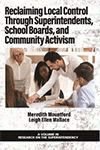
Reclaiming Local Control Through Superintendents, School Boards, and Community Activism
Edited by:
Meredith Mountford, Florida Atlantic University
Leigh Ellen Wallace, University of Wisconsin-Milwaukee
A volume in the series: Research on the Superintendency. Editor(s): Meredith Mountford, Florida Atlantic University. Leigh Ellen Wallace, University of Wisconsin-Milwaukee.
Published 2022
In 1987, Jacqueline Danzberger described school boards as the forgotten players. However, things have changed drastically for school boards over the past few years. No longer are school boards the forgotten players in school governance. Instead, school boards often find themselves in the center of controversies stemming from the intrusion of political partisanship into local governance structures which historically, and for the purposes of sustained democratic educational governance, were intentionally intended to be non-partisan elected boards. However, this is where many school boards find themselves today. The chapters in this volume address several key questions school board members are currently facing as they struggle to protect some of our country’s earliest guardrails of democracy; local control of schools. To be sure, school boards are no longer the forgotten players. Implications of this may be wide reaching and therefore deserve room in the current literature on educational governance.
Volume II of the Research on the Superintendency series highlights recent research on school boards, local control, governance, and the superintendency. Each chapter is briefly described and the chapters are in a particular order that readers may wish to pay attention to as they enjoy the book. The first three chapters deal with local control in both rural and urban settings. The next two chapters are studies focused mainly on school boards and how their roles have shifted over the years followed by a chapter on the relationship between school boards and their superintendents within a regulatory environment and the level of stress it can bring to board members and superintendents. The final five chapters describe recent superintendent research that is closely linked to school governance or school board policies. We ask readers to juxtapose lessons learned in those five chapters to the role of school boards within the context of those chapters.
CONTENTS
Losing Local Control: School Boards as Guardians of Democracy, eredith Mountford and Leigh Ellen Wallace. A History of Local Control and the Fight to Reclaim It Through the Superintendency, Brian Boggs and Amanda Miller. The Tension Between Pragmatism and Idealism: Understanding Urban Superintendents’ Efforts to Advocate for Equity, James Coviello. Governance Challenges & Micropolitics of the Rural Superintendency, James D. Laub and David M. Aslin. Kentucky Superintendents and Their School Boards: Evolving Context, Expectations, and Relationships, Victoria Sherif and Beth Rous. The Relationship of Superintendent Work, Board Relations, and a Regulatory Environment on Superintendent Health and Stress, Charol Shakeshaft and Kerry Robinson. Superintendent Perspectives on Effectiveness as Measured by State Standards, Nicole V. Williams, John C. Gillham, Jon Brasfield, and Jason Robinson. An Analysis of The Relationship Between Superintendent Turnover and District Performance, Dick M. Carpenter II. Illinois School Superintendents: Moral Purpose in Leadership of Nontraditional Teacher Pay, Nathan S. Schilling. A Real Unicorn: The Black Female Superintendent, Detra D. Johnson and Victoria Thomas. Efforts to Prevent Mass Shootings in Schools: The Practice, the Costs, and Superintendents’ Experiences with Arming School Personnel, Jacob D. Skousen and Spencer C. Weiler. Biographies.
-
Paperback979-8-88730-003-0
Web price: $45.04 (Reg. 52.99)
-
Hardcover979-8-88730-004-7
Web price: $80.74 (Reg. 94.99)
- eBook979-8-88730-005-4

- EDU001040 - EDUCATION: ADMINISTRATION: School Superintendents & Principals
- EDU034000 - EDUCATION: EDUCATIONAL POLICY & REFORM: General
- EDU032000 - EDUCATION: Leadership
-
 Catalytic Improvement Communities
Cultivating Flourishing Schools
Catalytic Improvement Communities
Cultivating Flourishing Schools
-
 Compassionate Leadership for School Improvement and Renewal
Compassionate Leadership for School Improvement and Renewal
-
 Polling Student Voices for School Improvement
A Guide for Educational Leaders - 2nd Edition
Polling Student Voices for School Improvement
A Guide for Educational Leaders - 2nd Edition
-
 Reflections on People, Policy, and Practices in Curriculum History
Reflections on People, Policy, and Practices in Curriculum History
-
 Supporting Leaders for School Improvement Through Self-Care and Wellbeing
Supporting Leaders for School Improvement Through Self-Care and Wellbeing
-
 The Contemporary Superintendent
(R)Evolutionary Leadership in an Era of Reform
The Contemporary Superintendent
(R)Evolutionary Leadership in an Era of Reform
-
 The Handbook for Aspiring Higher Education Leaders
The Handbook for Aspiring Higher Education Leaders

